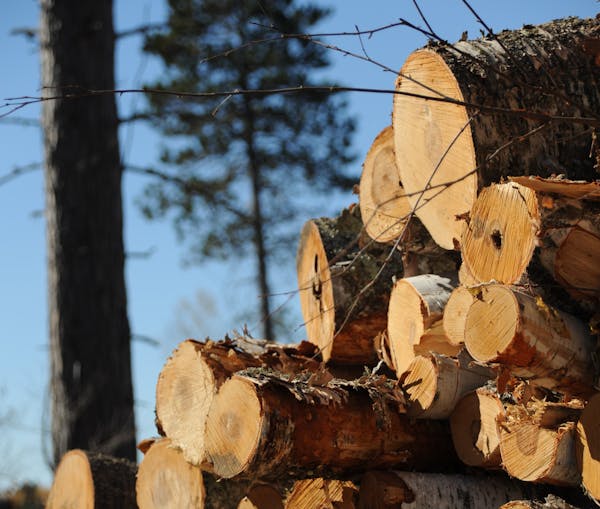In a rare and possibly unprecedented move to ensure that Minnesota complies with federal environmental laws when selling timber on state hunting lands, the U.S. Fish and Wildlife Service (FWS) has placed a hold on $22 million in wildlife habitat grant money.
FWS Midwest Acting Regional Director Chuck Traxler said Tuesday in an interview with the Star Tribune that there will be no negotiating the terms he set for the resumption of the payments. He outlined the demands in a letter he wrote Monday to Department of Natural Resources Commissioner Sarah Strommen. The commissioner said she's comfortable with the actions.
The letter states that the DNR violated wildlife habitat management grant conditions over an unspecified period by selling logging permits on federally aided lands without first documenting to FWS the wildlife purpose of the logging. FWS established the presale documentation requirement back in 2021, before it issued the most recent habitat grant covering the period of July 1, 2021, to June 20, 2023.
Traxler said $4 million of that fiscal 2021-2023 grant remains unspent and won't be released to the DNR until the agency provides "documentation/certification of the wildlife purposes'' for prior timber sales. In addition, FWS won't confer its next Pittman-Robertson habitat grant of $18 million until all compliance issues are firmly settled, he said.
"The Service will hold the FY 23-25 Minnesota Statewide Wildlife Habitat Management grant until both the Service and DNR agree all grant compliance and documentation issues are agreed to, as described above,'' Traxler wrote in his letter.
FWS Midwest Region spokesman Tim Patronski said he and others at the agency couldn't find any historical record of a similar monetary hold against another state. "As far as we can recall, we haven't had a similar instance,'' he said.
Strommen said Tuesday in an interview that she has "zero concerns'' that DNR can provide the needed documentation of wildlife purposes for prior logging on wildlife management areas (WMAs) and aquatic management areas (AMAs). She also said her agency is in agreement with FWS on the goal of managing WMAs and AMAs. Wildlife managers at both agencies believe logging can be a useful tool to benefit wildlife.
"We manage for wildlife purposes,'' Strommen said.
She said the hold on $22 million of grant money raised by the federal government through excise taxes on hunting and fishing equipment won't cause a budgeting problem at DNR. For decades on end, the so-called Pittman-Robertson and Dingell-Johnson grants have been essential funds at the agency.
Traxler said there's no evidence of any inappropriate spending of the money. "I think this is just a case of documentation,'' he said.
It's his hope that the financial steps taken by FWS, along with clear compliance mandates that result from the eventual grant payments, will bring an end to four years of discord over logging on wildlife lands in Minnesota.
It was in the summer of 2019 when 28 DNR field employees wrote to Strommen saying that a new logging program — established at the behest of the forest products industry — was hurting wildlife habitat on hunting lands and it was "scientifically dishonest'' for the agency to say otherwise. The employees complained to FWS and others that wildlife protections required under Pittman-Robertson Wildlife Restoration Act grant funding were being sacrificed to meet hard timber targets.
Some of those rank-and-file complaints were validated eight months later when two federal wildlife biologists monitored logging activity at three large Minnesota WMAs. According to a central finding in their report, DNR's Forestry Division appeared to be implementing timber harvests "primarily to meet commercial timber objectives.''
In Traxler's letter to Strommen this week, he said presale documentation of wildlife purposes is essential for FWS to ensure compliance with the National Environmental Policy Act, Endangered Species Act, and National Historic Preservation Act.
As part of the conditions in Traxler's letter, the DNR will temporarily stop offering timber for sale on any WMAs or AMAs. Late last week, DNR Fish and Wildlife Division Director Dave Olfelt acknowledged that the DNR recently withdrew three timber sales that were set to go to auction this summer in the Warroad forestry district.
Traxler wrote that DNR's forest management planning work will continue, and sales will resume once agreement on the form and timing of documentation is reached.
Hudson Kingston, legal director at Clean Up the River Environment (CURE), a Minnesota-based organization that works on rural environmental issues and agency accountability, said that while it is good for FWS to take action, it's also the case that the agency has allowed overharvesting of protected wildlife areas without identified wildlife purposes.
"Under the Pittman-Robertson Act, there is a duty to claw that money back, and I hope that FWS is ready to take action to assure that the taxes hunters and anglers have paid are returned in full," Kingston said.
He said the returned funds should be spent on wildlife habitat restoration.
In Washington, D.C., Public Employees for Environmental Responsibility (PEER) issued a news release applauding the move by FWS. Members of PEER took an interest in the case years ago and late last year called for withholding any unallotted federal aid from the DNR.
"It is outrageous that the Department of Natural Resources was using habitat restoration funds that would degrade the very habitats they were supposed to enhance,'' said PEER Executive Director Tim Whitehouse, a former senior Environmental Protection Agency enforcement attorney.
He described Minnesota's state-sponsored logging practices as backward and destructive.
"As Minnesota has learned, federal support of resource agencies is not an automatic pass-through,'' Whitehouse said.
A $2.8 billion settlement will change college sports forever. Here's how

Souhan: Anxiety and depression in the NFL helped inspire Lindsey Young's children's book

Reusse: Country boy Jim Marshall never lost his lust for life

Twins open homestand with loss to Blue Jays, Jeffers ejected after critical call


